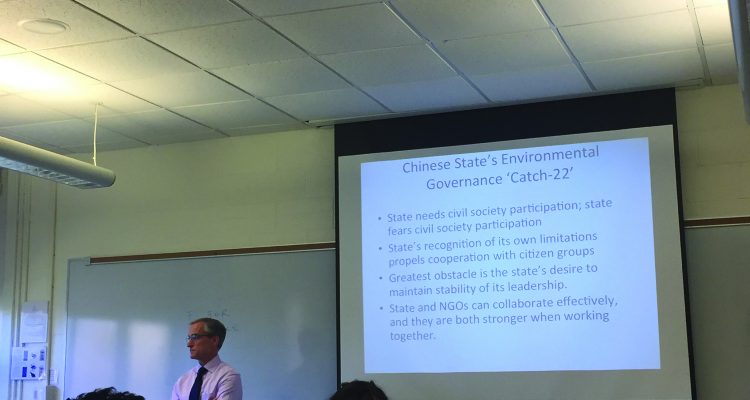The current relationship between the United States and China is one of the most important relationships in the 21st century that is related to world peace and prosperity. Environmental activism and protection are ideals that the U.S and China often strive for, as stressed by the Fairfield University Asian studies program.
On Wednesday, March 22, the Fairfield University Asian studies program invited Professor Scott Wilson, the Alfred W. Negley professor of the politics department and associate dean of global education at the University of the South, to give a talk entitled “Environmental Activism in the Shadow of China’s Authoritarian State.”
Wilson’s extensive research has been supported by grants from the Fulbright Commission, the Committee for Scholarly Communication with China, the United States and Japan Friendship Commission and the Appalachian College Association.
During the talk, Wilson stressed the issues of the environmental crisis that has been occurring in China for some time.
Wilson is also the author of “Tigers Without Teeth: The Pursuit of Justice in Contemporary China” and “Remade in China,” as well as several journal articles and book chapters. Throughout 2014 and 2015, Wilson researched Chinese environmental policy and citizen participation at Wuhan University’s Environmental Law Institute in Wuhan, China.
Professor in the history department and the director of the Asian studies program Danke Li believes many students can benefit from Wilson’s lecture.
“This topic is very important because environmental protection is a global affair that requires attention, participation and collaboration of all people in the world,” said Li.
“This lecture informed American students about environmental activism in China and what challenges and success the Chinese people are experiencing,” she continued.
Junior Angelica Leventhal found the lecture to be very insightful.
“I really enjoyed listening to Scott Wilson speak. I am currently taking environmental law and policy, and I realized that many of China’s issues are relevant to the U.S. issues regarding pollution and air quality,” said Leventhal.
According to Wilson, one of the main causes of the crisis is the lack of citizen participation.
“There are two lessons when it comes to the current state of China. For one, the state has limited capacity to enforce its regulations. Secondly, an increased amount of citizen participation might help to oversee the environmental problems and help improve the ongoing circumstances,” said Wilson.
According to Wilson’s research, there are two forms of citizen participation: public interest litigation and the monitoring of pollutants by civil society organizations.
The strides made would be substantial in terms of citizen participation in the shadow of a hierarchy, Wilson said.
Part of the reasoning as to why there is a lack of citizen participation is due, in large part, to an inadequate government system.
“An inadequate investment, weak penalty system, lack of funding and resources, structure of a command-and-control system and environmental protection bureaus funded by the local government all add to the environmental conflict at hand,” said Wilson.
In addition to these factors, the Chinese government also has a significant problem with corruption.
“The local officials earn money based off of how big the local economy is. The conflicts of interest are rife. They really undermine the process of enforcing the Environmental Protection Bureau,” explained Wilson.
Sophomore history student present at the event Allison Coffey was not aware of the ramifications of the Chinese environmental crisis at hand and praised Wilson for his lecture.
“I learned so much from Wilson’s talk. I did not even know that China was in such an environmental crisis. I’m glad to see that the citizens of China are fighting to take a stand to try and get involved in order to help the environment as well as the state,” said Coffey.
Junior Gabriel Pamich found what he learned at the talk to be quite fascinating.
“I was very surprised to hear of such a major issue occurring in one of the most prominent countries, with very little to no engagement for so long. I am happy to see that China is beginning to respond to the environmental crisis as it has been proven to also be a global issue,” said Pamich.
At the end of the lecture, Wilson held a question and answer portion with those in attendance. When asked if he thinks China can overcome this environmental crisis, Wilson had mixed feelings.
“China’s state is in a ‘Catch 22’ right now. It cannot do much on its own. Instead it needs civil society. The problem is, it also fears civil society. It is willing to bring in some civilian participation, but still tries it’s hardest to limit it,” said Wilson.
“I think things are improving in some ways. China is setting high targets and missing most of them. But if I were to bet on China’s commitment to green energy conversion versus the United States, I would bet on China,” continued Wilson.
In regards to involving members of civil society, Wilson believes much has been achieved, however, the main thing to work on is finding a healthy balance between government and civil society.
“Progress has indeed been made, but there is always room for more,” said Wilson.


Leave a Reply